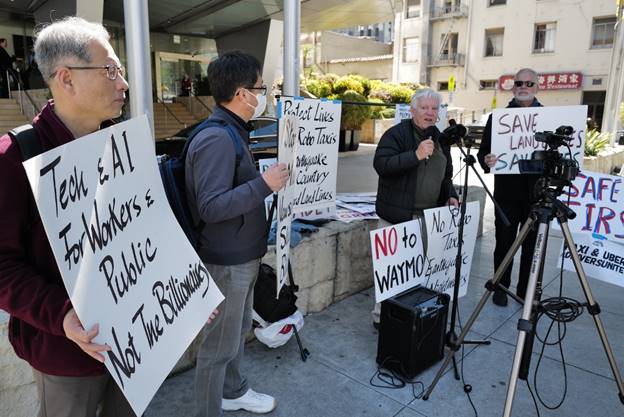
Earthquakes, Robo-Taxis and Land Lines, a Looming Disaster
Report and photos by Phil Pasquini

Washington: Ahead of the 118th annual San Francisco 1906 Earthquake Commemoration on April 18, a speak-out/press conference was held across from historic Portsmouth Square in the City’s Chinatown to express grievous concerns regarding the state of preparation for the next earthquake when considering the issues of robotaxis and the possible loss of landline telephones. Portsmouth Square is historically important, too, for the event as it is where in the aftermath of the1906 earthquake, having been unscathed, it was used as a refugee camp for displaced victims of the disaster.
Earthquake preparedness, along with robotaxis and a proposal by AT&T now before the CPUC (California Public Utility Commission) calling for the company’s release from providing landline phone service to four million customers across the state, were the interrelated topics of discussion in calling for “people before profits.”
As per its application before the CPUC, AT&T describes the need for terminating landline service as a “plain old telephone service” and in its seeking “…tailored relief from its outdated COLR its (Carrier of Last Resort) obligation, which effectively mandates that AT&T California maintain a copper-based network throughout its service territory. In effect, this obligation requires AT&T California, but not its major competitors, to wastefully operate and maintain duplicative networks: one, an antiquated, narrowband network with an ever-dwindling base of subscribers, and the other, a forward-looking fiber and wireless broadband network.”
Overlooked is the fact that many people cannot afford cell phone service or are able to use a cell phone while many others who live in rural locations are beyond the limits of cell phone coverage and thus are unable to connect to summons help in an emergency. As any cell phone user can attest, even under the best of conditions, coverage can be intermittent at times.
The presenters voiced their concerns for all these reasons and more in a modern era that sees cell phones as the way of the future. They noted, too, that discontinuing landlines in an earthquake-prone city whose streets are flooded with robotaxis which are dependent on cell phone tower coverage that is easily overwhelmed during normal times and especially so during a disaster is sheer madness.
Robotaxis have adequately proven over and again how they can interfere with and block emergency vehicles and traffic during normal operations, and when losing coverage and unable to connect, they stop functioning wherever they happen to be. As wireless demand increases during an emergency, cell phone systems become overloaded, can lose power, and or simply shut down. Without hard-wired copper landline phones, in the absence of cellular coverage, people are unable to communicate or call for help making an already dangerous situation even more so at the peril of the loss of life and property.
Steve Zeltzer of the United Front Committee for a Labor Party (UFCLP) and of the Safe Streets Coalition questioned what would happen in earthquake-prone San Francisco “when you have robotaxis on streets without drivers?” He related that they would “shutdown” when cell phone service was interrupted or for other reasons. “A week before Chinese New Year when fireworks were going off up the street, a robotaxi shut down in the middle of the street. And as a result, some people broke the windows and set it on fire because they were angry that it was blocking the road.” He went on to say that robotaxis do not have the ability to back up, “and yet a requirement to get a driver’s license in California is that you have to demonstrate that you can back up. The people of San Francisco need to be protected from robotaxis along with workers whose jobs would be eliminated due to AI and this autonomous transport automation.”
Eduardo Escobar, founder of the Alliance for Independent Workers, spoke about robotaxis by illustrating a situation last year during the Outside Lands music festival when heavy cell phone usage caused ten robotaxis to shut down in a group next to each other in the North Beach area of the city that resulted in a massive traffic jam. The cars were unable to move due to high cell phone demand related to service connection issues that in turn froze the robotaxis in place blocking streets and intersections.
He said that as a result Google, Waymo, and Amazon Zoox “Have suggested that they want us to pay for infrastructure to provide their own cell towers for the companies.” That’s big companies calling upon us to pay for their infrastructure so that they can drive us out of work, drive us out of a living. This is the privatization of the public trust. They put profits before people 24/7.”
AT&T’s COLR obligation for providing landline telephone service is part of a 1982 decree that allowed the company to purchase the Pacific Telephone Company in the breakup of the nationwide “Ma Bell” monopoly. Its purpose as explained in the CPUC document was to ensure “…that everyone in California has access to safe, reliable, and affordable telephone service. AT&T is the largest COLR in California in many parts of the state. Where AT&T is the default landline telephone service provider, it must provide traditional landline telephone service to any potential customer in that service territory. AT&T’s proposal calls for its withdrawal as the COLR in certain areas without a new carrier being designated as a COLR.”
“If the proposal is approved as set forth in its application, then no COLR would be required to provide Basic Service in the areas in which AT&T is the COLR. This does not necessarily mean that no carriers would provide service in the areas—only that they would not be required to do so. Other outcomes are possible, such as a carrier other than AT&T volunteering to become the COLR, or the CPUC denying AT&T’s proposal.”
It seems highly unlikely that another company would take over the COLR obligation for a “plain old telephone service” in a high-tech cellular era if AT&T is allowed to drop its obligation based on its desire to do so in what looks more like a profitable move for the company than one ensuring public safety. The net effect was pointed out by the activists saying that “A major earthquake would also disrupt cell phones meaning that landlines would be the only means of communication. We must protect workers and the public.”
Ironically, at the Augusta National Golf Club in Georgia where the Masters Tournament was played, cellphones were not allowed and AT&T, a sponsor, provided guests of the tournament access to landline phone banks to make free calls worldwide. Evidently, “plain old telephone service” is good enough to advertise the high-tech cell phone company by accommodating the guest’s telephonic needs regardless of cost. But in their way of thinking, landlines need to be removed in areas susceptible to natural disasters because of the cost of operating an expensive “plain old telephone service” is not profitable enough. This beckons the question of why public safety is viewed actuarily and not as a lifeline to society. “Profit over People” is how the activists described the entire matter on both issues.
If the proposal to terminate landline service is granted, this backup line of defense during a cell phone shutdown in an emergency would not only imperil Californians, but as California goes, so eventually goes the nation.
(Phil Pasquini is a freelance journalist and photographer. His reports and photographs appear in the Washington Report on Middle East Affairs and Nuze.ink. He is the author of Domes, Arches and Minarets: A History of Islamic-Inspired Buildings in America.)

